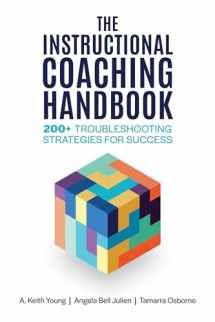
The Instructional Coaching Handbook: 200+ Troubleshooting Strategies for Success
Book details
Summary
Description
Review
I wish I had had this book in the '70s when I started as an instructional coach. I would have learned that there is no singular best way to be in the role. Keith and his colleagues have captured the wisdom that "matching is the name of the game" - that selecting the best-fit approach across the directive to non-directive continuum is what skillful coaches learn how to do. They can diagnose the appropriate method to engage teachers with data and conduct conversations that are maximally helpful.
No one is more versed in the coaching literature of this century or more respectful in crediting forebearers and fine minds in the field than Keith Young, Tamarra Osbourne, and Angela Bell Julien. They have, indeed, created a synthesis of wise practitioners through the decades, but they have added new dimensions to the field. In addition to the equity strand built into their concept of the coach's role, they place new emphasis on developing teacher belief about all students' capacity to learn despite the conditions of their birth. For leaders and coaches committed to equity, this book is a new window.
The Instructional Coaching Handbook also takes on the broadest range I have seen in areas that pertain to successful instruction, including coaching for SEL learning and coaching to move teachers toward mature professional stances of openness and humility about their own learning. They even include the critical area of coaching teachers to be effective team members. These are vital areas for professional growth well beyond traditional foci of problems of practice or implementation of new curricula. They are addressing here essential elements of professionalism that are as much a part of high-expertise teaching as knowing how to design good lessons and plan effective implementation.
They also recognize that "the most intensive and time-consuming coaching strategies revolve around planning and helping teachers understand the larger context and multiple factors involved in teaching day-to-day."
Particularly interesting is the section on teacher assumptions or beliefs that interfere with their learning new behaviors. The authors' approaches here show the wisdom of and necessity for getting inside coachees' frames of reference. As an aside, I am struck by the effectiveness of the diagrams throughout the book. They have the look of attractive hand-drawn informality, but the cause and effect connections they lay out are particularly clear.
This book is an encyclopedia of concrete, actionable tips (small actions) and strategies (sequences of steps they spell out with directions) for coaches, grouped in easy-to-find categories. Even though there is theoretical coherence to the design of the book, one can open almost any page in the central chapters and find something clearly understandable and empowering to do in practice.
The book is full of scripts and vignettes of coach/coachee interactions. Often the individual ideas are collected and presented as they occurred in an actual case study, which they call an "Implementation Story." These are actual coaching episodes drawn from the experience of the authors. In these stories, they display a text version of modeling-thinking-aloud; it's actually modeling-their-thinking through sharing it in writing as the Implementation Story unfolds.
To assemble this invaluable handbook, I can imagine the days and days of talking, emailing, and google docing these authors must have done, spread out over years, comparing notes, collecting and categorizing ideas, and putting into accessible language their collective wisdom. There are no leaders or coaches who will not get new ideas from this carefully crafted book, no matter how experienced they are.
"From the forward of The Instructional Coaching Handbook." -- Jon Saphier, Founder, Research for Better Teaching, and author of The Skillful Teacher.
Three instructional coaches share more than 200 of the most helpful problem-solving s


We would LOVE it if you could help us and other readers by reviewing the book
Book review



